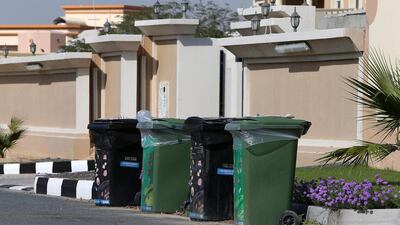When I first moved back to Abu Dhabi last year I was excited to see a lot more recycling bins around the city in cafes and public spaces. Having previously lived in New York City, recycling was one of the things that had become ingrained as part of my daily habits. This reached far beyond separating paper from plastic, it extended to trying to be more aware of how to adopt more energy-efficient habits and trying to monitor my energy and water usage. Although nowhere near as extensive as in cities such as San Francisco or Vancouver, the eco-friendly culture was definitely something that was more prevalent than anything I had experienced in the UAE. Recently, I went to get coffee at one such newly "green" venue and noticed the recycling bins had turned into regular bins. Apparently it was because nobody used them appropriately.
I think engendering new habits within society requires small steps. A very basic first step is to make recycling a more widespread practice. Dubai Municipality’s “My City, My Environment” have brought door-to-door recycling services to 15 communities across Dubai since its initiation in 2012. Residents in participating communities were asked to separate their waste into two bins provided for them: one green for all recycling and one black for general waste. Programmes like this can catch on with a little more awareness and education. I often look at the amount of plastic bottles or cans that many households throw out and think that it’s really unfortunate that we don’t have the proper infrastructure to handle recycling.
It has been reported that Dubai is recycling 20 to 25 per cent of its waste and aims to reach 75 per cent by 2021. In order to reach these goals across the country we need to increase education and awareness about the issues. People need to know not only the benefits of proper waste management for the country and by extension, the planet as a whole, but also realise the negative consequences of not trying to change our practices.
This should also extend to how we treat “waste” in other sectors such as water and energy. This calls for a more holistic understanding of why we need to change many of our habits. We need to think about what part we can play in protecting our resources and preventing a large amount of unnecessary waste. This needs to begin on a personal or household level since it had been reported that the per capita generation of waste is high in the UAE when compared to the international average.
According to estimates by the Centre of Waste Management Abu Dhabi’s 2010 report, the emirate of Abu Dhabi produces around 21 million tonnes of solid waste a year – between 1.8 and 2.4 kilograms per day per person. Recycling some of that could go a long way, because recycling is said to require far less energy to process, uses fewer natural resources, causes less water pollution and keeps waste from piling up in landfills or having to be incinerated.
When we look at numbers for water and energy consumption, they are also high. It is estimated that UAE residents use between 250 and 550 litres of water and 20-30 kilowatt hours (kWh) of electricity a day, compared to the international average of 170 to 300 litres and 15 kWh per day respectively. Similarly energy usage, especially in the summer months, is above international averages. The UAE has one of the highest energy consumptions per capita in the world. The average resident consumes 20 to 30 kilowatt hours per day, compared to the international average of 7 to 15 kilowatt hours.
It is important to change our habits because water and electricity are precious resources and recycling can go a long way in protecting the environment from further pollution. Therefore we need to invest in methods that allow us to use our resources as efficiently as possible. This is not only to better meet the growing needs of our people but also in order to protect and provide capacity for future generations.
Growing capacity or constantly searching for new natural resources is not enough; conservation and recycling can go a long way as a part of a comprehensive sustainable development plans. More than 40 year ago our founding father, Sheikh Zayed bin Sultan Al Nahyan, began a legacy that very much included environmental protection – it is the least we can do to maintain that.
Fatima Al Shamsi is an Emirati who recently returned from New York City after pursuing a master’s degree in Global Affairs at New York University

